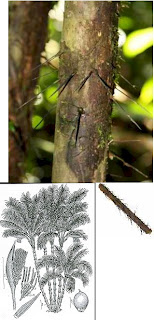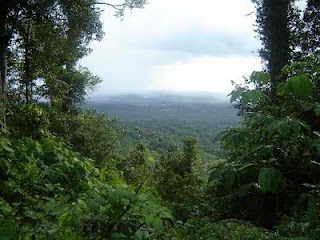 |
| Top: Astrocaryum palm; bottom: awarra and a detail drawing of one of the stingers from the Astrocaryum |
From page 375 of the book: “My limbs were shaking,” he explained, “since I was so stupid as to walk out into the darkness unassisted. I had no gun. Foolish man, I know but I honestly felt the presence of God with every whiff of nectar from the red blooms of the manil tree; I felt his presence in the poisonous spines of the Astrocaryum palm and the Bactris. You rub up against them and you’re as good as a dead man because of their stingers.”


























